Search the Special Collections and Archives Portal
Search Results

Photographs of Bonanza Gift Shop, Las Vegas (Nev.), March 6, 2017
Date
Archival Collection
Description
Site address: 2440 S Las Vegas Blvd
Sign owner: Haim Gabay
Sign details: The Bonanza Gift Shop opened in 1981 marketing as the world's largest gift shop. Though in 1963 a portion of the property opened as an Honest John's Casino. In 1971 the Big Wheel opened next to Honest John's Casino. After 1974 Big Wheel changed to Centerfold Casino 1975-1977. In 1977 the Centerfold Casino changed to Jolly Trolley Restaurant, Saloon and Dining Depot. From 1977-1981 Jolly Trolley remained at the location; it seems at one point Jolly Trolley took over the entire shopping center and casinos. Between 1977 and 1981, a 24 Hour Adult Book Store was taken over by Jolly Trolley that allowed Bonanza Gift Shop to purchase the whole property. The sign's design and theme has stayed the same from 1963 to current. The gift shop was sold for $50 million in 2016 to Haim Gabay.
Sign condition: 3- the paint is peeling off, and the signs have holes in them. The incandescent light bulbs and marquee are not working to full capacity; some portions do not light up at all.
Sign form: This is considered an architectural sign with the reader boards-marquee built into the building. The sign at the end of the corner is considered a cantilever construction.
Sign-specific description: The sign is mainly rusty red and a gold-yellow that surrounds the building with multiple "Bonanza Gift Shop" logos in a old west type font. Also there is a reader board surrounding the building as well.
Sign - type of display: The Display used is a reader board, neon, incandescent, and fluorescent lighting.
Sign - media: Plastic, Steel and Fiberglass
Sign - non-neon treatments: Plastic for reader board
Sign animation: Chasing
Notes: Incandescent light bulbs that surround the building and logos
Sign environment: The property is on the west corner of Las Vegas Blvd and Sahara. The stores surrounding the establishment are Naughty Town, Walgreens, Essence Cannabis, Strip Gun Club and Diversity Tattoos.
Sign - date of installation: Estimated 1963 or earlier
Sign - date of redesign/move: 1963 Honest John's cantilever construction. 1971 Big Wheel opened up and added the projection sign. In 1974 the Big wheel changed to Centerfold Casino and in 1977 name changed to Jolly Trolley. In 1981 the Jolly Trolley projection and cantilever construction sign changed to Bonanza Gift Shop.
Sign - thematic influences: The sign dates back to 1963 and resembles the golden nugget decorated shed concept along with the cantilever construction sign similar to golden nugget's 1946 sign, except circular rather than organic. The actual sign uses color psychology to attract consumers to the gift shop. The theme is definitely western themed.
Survey - research locations: https://www.reviewjournal.com/business/bonanza-gift-shop-in-las-vegas-sold-for-50m-records-show/ about new owner purchase. Vintage Las Vegas http://vintagelasvegas.com/search/Bonanza+Gift+Shop helped with dates of property change. Author Paul W. Papa's book "Discovering Vintage Las Vegas: A Guide to the City's Timeless Shops"
Surveyor: Gisselle Tipp
Survey - date completed: 2017-08-12
Sign keywords: Architectural; Plastic; Steel; Incandescent; Chasing; Reader board; Neon; Marquee; Fluorescent; Roof Sign
Mixed Content

Photographs of PublicUs sign, Las Vegas (Nev.), April 18, 2017
Date
Archival Collection
Description
Site address: 1126 Fremont St
Sign owner: Kimo Akiona, Cole McBride and Travis Landice
Sign details: PublicUs opened in 2015. This property has previously held other restaurants the most recent being a Philly Cheese Steak restaurant. PublicUs represents "for the people" in Latin. Hemant Kishore is the baker and chef. This location is a canteen-style restaurant and coffee house where they make all organic foods in house.
Sign condition: 4- the steel part of the sign looks relatively new and has bright paint, but the plastic portion for the sign does some aging to it.
Sign form: Pylon
Sign-specific description: On the corner of Fremont E and Maryland pkwy at the corner of their building there is a blue been sticking out of the ground that is curved at the top. Near this curved section is a rectangle steel sign box that has a back lit plastic sign in it, and underneath is a similar rectangular box. The bigger rectangular box has a white background, but has the a light tan box with PublicUs logo in white letters in the light tan brown box. The smaller box on the bottom has the white backdrop and the tan colored rectangle has Fremont Village written in a white font. Both rectangle signs have an arrow pointing through them with the tip of the arrow above their main logo sign and the "feathers" of the arrow underneath Fremont Village sign.
Sign - type of display: Backlit plastic sign and incandescent light bulbs
Sign - media: Steel and plastic
Sign - non-neon treatments: Plastic back lit portion of sign
Sign animation: Flasher for incandescent light bulbs
Sign environment: This is located on the corner of Maryland Pkwy and Fremont Street East. Surrounding this property is a lot of old motels that have been shut down, and painted over though many of their neon signs are still up and some working. On the same block as them is a vintage barber shop and a vintage tattoo parlor.
Sign manufacturer: Main portion of the sign was around before they opened so information on the base of the sign was not found
Sign - date of installation: The sign box has records of being around longer than the PublicUs has, records (Google Maps satellite view) show the sign similar to this has been up since at least 2013
Sign - date of redesign/move: Late 2015 is when their main logo was installed
Sign - thematic influences: This sign shows how signs can be re-purposed or can evolve with different colors and slightly different designs over the years even though the theme of the property has changed.
Sign - artistic significance: The arrow in the sign could signify a bulls eye in the sense that you are looking in the right spot or have found the perfect spot.
Survey - research locations: Google Maps satellite view, Sprudge coffee blog http://sprudge.com/publicus-97938.html , Eating Las Vegas http://www.eatinglv.com/2015/03/publicus-is-open-and-baking-for-the-people/
Survey - research notes: This restaurant has faux trees and nice wooden tables inside to make it feel as though you are outdoors but still in a homey place.
Surveyor: Emily Fellmer
Survey - date completed: 2017-08-18
Sign keywords: Plastic; Backlit; Incandescent; Steel; Flashing; Pole sign
Mixed Content
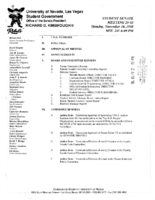
Meeting minutes for Consolidated Student Senate University of Nevada, Las Vegas, November 16, 1998
Date
Archival Collection
Description
Text
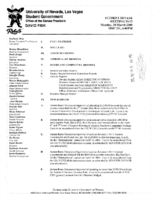
Meeting minutes for Consolidated Student Senate, University of Nevada, Las Vegas, March 20, 2000
Date
Archival Collection
Description
Text
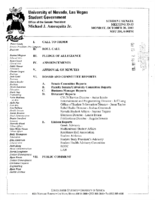
Meeting minutes for Consolidated Student Senate, University of Nevada, Las Vegas, October 20, 2003
Date
Archival Collection
Description
Text
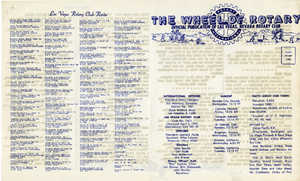
The Wheel of Rotary Las Vegas Rotary Club newsletter, September 22, 1949
Date
Archival Collection
Description
Text

Benilda Long Somes oral history interview: transcript
Date
Archival Collection
Description
Oral history interview with Benilda Long Somes conducted by Vincent Long on November 29, 2021 for Reflections: The Las Vegas Asian American and Pacific Islander Oral History Project. Benilda discusses her life in Magalang, Philippines and her immigration to Saipan, part of the Northern Mariana Islands, as a young woman. She talks about meeting her partner, airman Robert Long, the birth of their son, and Robert's untimely death in an air crash less than a year later. Benilda shares how she and her child immigrated to the United States to be with family and their move to Las Vegas, Nevada in 2009.
Text

Photographs of Backstage Bar & Billiards, Las Vegas (Nev.), 2016-2017
Date
Archival Collection
Description
Site address: 601 Fremont St
Sign owner: DJ Lethal co-owned with DJ Scotty
Sign details: This building dates back to 1957. Triple B opened in 2012 as a billiard hall bar and concert venue. It is filled with a lot of Rock Memorabilia which includes a "turntable library" which they claim showcases over 8 decades of rock history. This location was furnished by rock outfitter Anvil Cases. This property got its name by being "backstage" to the adjoining Fremont Country Club.
Sign condition: 5- looks relatively new and still in great condition
Sign form: Variation of a Bull Nose Sign
Sign-specific description: Their entrance is on the corner of 6th (going South) and Fremont with a blue bull nose type sign in a triangle shape. The base of the triangle sign is right above the entrance. The triangle border has a blue (argon) strip with incandescents lining both sides of the neon tubing. At the base of the sign there is a blue (argon) curved platform (half circle placed adjoining to the base of the triangle). On this platform there are 5 separate strips of argon tubes. Above the platform states "Backstage Bar & Billiards" in white cursive channeled letters. Above the words Backstage and Billiards there are two martini glasses with a pool ball and flag in each glass. At the top of the triangle portion of the sign there is their logo "Triple B" in cursive with Triple in Blue and B in white. Below the bull nose sign there is a reader board that wraps around the building. This reader board is also lined with incandescent light bulbs. In the middle of the of the reader board there is a black background rectangle with 3 rhombus's lined in incandescent light bulbs in a design.
Sign - type of display: Neon, incandescent and reader board
Sign - media: Steel and Plastic
Sign - non-neon treatments: Reader Board
Sign animation: Flasher for incandescent light bulbs
Sign environment: Fremont East district East District, next to other bars and restaurants. This location is right across the street from the El Cortez. Also they claim to be "backstage" to the adjoining Fremont Country Club which inspired their name.
Sign manufacturer: Ultra Signs' recently bought out by Jones Las Vegas ( of Jones SIgns) who did not have records of this sign.
Sign - date of installation: 2012 when the bar opened
Sign - thematic influences: On Fremont many of the entrances are at the corner intersections, so the bull nose sign has been prominent design type to draw attention to the entrance of the company. This is remnant of the Golden Nugget and Binion's Horseshoe put up their bull nose signs in 1961.
Sign - artistic significance: The curved platform at the bottom of their bull nose sign looks like an old retro movie theater style sign platform that you would see in the 1940's/50's. Particularly with their reader board with incandescent light bulbs speaks to this era as well.
Survey - research locations: Assessor's page, triple B website http://www.backstagebarlv.com/ , Las Vegas Weekly Newspaper article https://lasvegasweekly.com/nightlife/lowball-diary/2012/dec/05/triple-b-fills-downtowns-watering-hole-hole/
Survey - research notes: Fremont Bars.com has a photo of their main sign being installed. http://www.fremontstreetbars.com/2012/11/29/welcome-to-the-neighborhood-backstage-bar-billiards/
Survey - other remarks: The Ultra Signs logo is visible on the left side of the sign.
Surveyor: Emily Fellmer
Survey - date completed: 2017-08-11
Sign keywords: Neon; Incandescent; Steel; Plastic; Flashing; Reader board; Bullnose; Marquee
Mixed Content
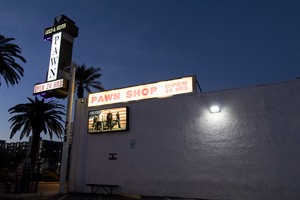
Photographs of Gold and Silver Pawn Shop signs, Las Vegas (Nev.), March 3, 2017
Date
Archival Collection
Description
Site address: 713 S Las Vegas Blvd
Sign owner: Richard Harrison
Sign details: This pawn shop was opened by Richard Harrison in 1988. Rick , Richard and Corey Harrison along with Austin Russell made this store famous with the History Channel reality T.V. show Pawn Stars which started airing in 2009. This show has made this location a tourist destination, so much so there is even a line to get in sometimes. With the rise of popularity they added Rick Harrison's Pawn Plaza which is a shopping center with eateries.
Sign condition: 4- looks relatively new and not too faded
Sign form: Rectangular Blade
Sign-specific description: The whole blade sign is outlined with a gold trim and red LED lights surrounding the gold. The main long rectangle blade spells out "PAWN" lengthwise in black on white backdrop. Right above the white part of the blade is a black rectangle (long side of rectangle is above the white blade) stating "Gold & Silver" written in white thin printed letters. Above this is a little white diamond. Below the white PAWN blade is a white rectangle stating "OPEN 24 HRS" in red block print letters. This blade-type sign is held right next to the building on a big white beam that has their address "713" painted on it. On the building above the entrance states "World Famous (in yellow) Gold and Silver (In red) Pawn Shop ( in Green) in back lit plastic letters. Also to the left of the entrance they have 3 plastic rectangle back lit signs that they have switched out over the years, but the current ones have been up since 2011/12. The one in the middle states "World Famous Gold & Silver Pawn Shop" in an elaborate white cursive font written on a black background. The other two showcase the Welcome to Fabulous Las Vegas Logo but states "World Famous Gold & Silver Las Vegas" . Below these three rectangle signs there is another smaller one with a white background stating "We Never Close" in thick blue type font letters.
Sign - type of display: Back lit plastic signs, LED lights
Sign - media: Steel, Plastic
Sign - non-neon treatments: Back lit plastic
Sign animation: Charger with red LED's
Sign environment: Halfway between the strip and downtown on Las Vegas Blvd. There are a few antique shops near the pawn shop. Right next door is now Rick Harrison's Pawn Plaza Shopping Center as well as a nice sized parking lot to accommodate their guests.
Sign - date of installation: Has been up since at least 2007
Sign - date of redesign/move: Some of the plastic back lit signs have been switched out over the years
Sign - thematic influences: Gold+ Silver- could refer to the mining times in Nevada and since it is a pawn shop it could mean that you can strike it rich with bringing something there. Similar to finding gold or silver.
Sign - artistic significance: The blade type sign was popular in the 50's for directions in the car consumer and traveling era.
Survey - research locations: Acessor's page, Nevada Magazine http://nevadamagazine.com/home/inside-the-magazine/city-limits/gold-silver-pawn-shop/ , Gold and Silver Pawn Shop website https://gspawn.com/ , history.com for information on the show
Surveyor: Emily Fellmer
Survey - date completed: 2017-08-12
Sign keywords: Backlit; Plastic; LED; Steel; Pole sign
Mixed Content

